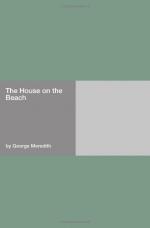“Phil Ribstone, if you like,” said the other, without rising.
“Oh, ah, indeed!” Tinman temperately coughed.
“Yes, dear me. So it is. It strikes you as odd?”
“The change of name,” said Tinman.
“Not nature, though!”
“Ah! Have you been long in England?”
“Time to run to Helmstone, and on here. You’ve been lucky in business, I hear.”
“Thank you; as things go. Do you think of remaining in England?”
“I’ve got to settle about a glass I broke last night.”
“Ah! I have heard of it. Yes, I fear there will have to be a settlement.”
“I shall pay half of the damage. You’ll have to stump up your part.”
Van Diemen smiled roguishly.
“We must discuss that,” said Tinman, smiling too, as a patient in bed may smile at a doctor’s joke; for he was, as Crickledon had said of him, no fool on practical points, and Van Diemen’s mention of the half-payment reassured him as to his old friend’s position in the world, and softly thawed him. “Will you dine with me to-day?”
“I don’t mind if I do. I’ve a girl. You remember little Netty? She’s walking out on the beach with a young fellow named Fellingham, whose acquaintance we made on the voyage, and has n’t left us long to ourselves. Will you have her as well? And I suppose you must ask him. He’s a newspaper man; been round the world; seen a lot.”
Tinman hesitated. An electrical idea of putting sherry at fifteen shillings per dozen on his table instead of the ceremonial wine at twenty-five shillings, assisted him to say hospitably, “Oh! ah! yes; any friend of yours.”
“And now perhaps you’ll shake my fist,” said Van Diemen.
“With pleasure,” said Tinman. “It was your change of name, you know, Philip.”
Look here, Martin. Van Diemen Smith was a convict, and my benefactor. Why the deuce he was so fond of that name, I can’t tell you; but his dying wish was for me to take it and carry it on. He left me his fortune, for Van Diemen Smith to enjoy life, as he never did, poor fellow, when he was alive. The money was got honestly, by hard labour at a store. He did evil once, and repented after. But, by Heaven!”—Van Diemen jumped up and thundered out of a broad chest—“the man was one of the finest hearts that ever beat. He was! and I’m proud of him. When he died, I turned my thoughts home to Old England and you, Martin.”
“Oh!” said Tinman; and reminded by Van Diemen’s way of speaking, that cordiality was expected of him, he shook his limbs to some briskness, and continued, “Well, yes, we must all die in our native land if we can. I hope you’re comfortable in your lodgings?”
“I’ll give you one of Mrs. Crickledon’s dinners to try. You’re as good as mayor of this town, I hear?”
“I am the bailiff of the town,” said Mr. Tinman.
“You’re going to Court, I’m told.”




